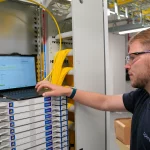Gov Funding Brings Gigabit Broadband to 1 Million UK Premises UPDATE2

The UK Government has announced that public subsidy via both the past c.£2.54bn Superfast Broadband (SFBB) and current £5bn Project Gigabit roll-out schemes has, since August 2012, helped to expand gigabit-speed network coverage to 1,006,800 additional homes and businesses. A number of new satellite “Alpha Trials” have also launched.
Just to give all of this the proper context. The SFBB programme – managed by the Building Digital UK agency – was first setup back in 2010 to help extend “superfast broadband” (24-30Mbps+) connectivity to areas that were not expected to benefit from commercial deployments anytime soon (note: commercial coverage of “superfast” lines reached c.76% and SFBB helped to go beyond that toward 98% today).
Most of the services deployed under the SFBB programme were hybrid-fibre (e.g. Openreach’s VDSL2 based FTTC lines) and fixed-wireless access (FWA) based networks – from various operators. But in the final years the SFBB scheme also managed to deliver hundreds of thousands of additional premises using gigabit-capable Fibre-to-the-Premises (FTTP) technology, which is where much of today’s total comes from.
Advertisement
The SFBB programme has in the past 2-3 years been superseded by the government’s new £5bn Project Gigabit scheme, which lifts the performance target to 1000Mbps (200Mbps on uploads) and focuses most of its effort on helping to upgrade the “hardest-to-reach” (final 20% of mostly rural) UK premises. The goal is to extend 1Gbps coverage to at least 85% of UK premises by the end of 2025 and then “nationwide” coverage (c. 99%) by around 2030 (here).
The combination of both programmes has thus helped to deliver today’s total of 1,006,800 additional premises with access to gigabit broadband speeds (including 68,800 in Scotland, 108,800 in Wales and 118,900 in Northern Ireland – the rest are from England). But it should be said that Project Gigabit itself hasn’t yet been running long enough to have much of an impact upon this total.
The total also includes 5,300 public buildings (e.g. schools, libraries, hospitals, police stations, council offices and more).
Michelle Donelan, Technology Secretary, said:
“Achieving a million gigabit-ready premises shows our plan to turbocharge British broadband is working. Thanks to our investment, rural communities held back by achingly slow internet can now tap into the best speeds on the market.
The UK is rolling out gigabit networks faster than any country in the EU, with 8 in 10 premises now able to access upgrades. It is a track record that shows we are rapidly building the infrastructure Britain needs to improve lives and grow the economy.”
The announcement notes that over £1.1 billion has already been signed in Project Gigabit contracts to connect more than 700,000 premises in England, from Northumberland, Durham and Cumbria to Cornwall, Norfolk and Suffolk over the coming years, so that 1m total of covered premises is set to grow.
Advertisement
Speaking of which, today also brings news of more than £77m worth of Project Gigabit contracts being signed to connect around 32,400 rural premises across Gloucestershire, West and parts of North Yorkshire. But we’ll cover those in a separate article.
Today’s announcement also comes as the Government outlines details of UKRI’s £70m Future Telecoms Programme, funded through the UKRI Technology Missions Fund and supporting one of five critical technologies, which will see 16 UK projects share £22m to support development and commercialisation of cutting-edge tech solutions and lay the groundwork for the networks of the future.
Meanwhile, £40m will provide further support for three existing Future Telecoms Research Hubs – led by Imperial College London, Oxford, and Cambridge Universities – alongside the creation of a dedicated national infrastructure for future telecoms testing and development linked to the UK National Dark Fibre – to support research in 6G, developing new architectures and networks for end-to-end connectivity, embedding AI and computing and developing wireless access systems such as cell-free networks and optical wireless integration.
Finally, the UK is also delivering high-speed, reliable connectivity to some of our very hardest to reach locations using satellite connectivity through the ‘Very Hard to Reach Alpha Trials’. These trials are testing the extent to which Low Earth Orbit (LEO) satellites can be used to deliver faster low latency broadband connections to areas which are typically beyond the building capability of most fixed-line ISPs.
Advertisement
A range of sites are already benefiting from LEO based satellite broadband connections, including at Rievaulx Abbey in North Yorkshire, mountain rescue teams based in the Eryri National Park, and Papa Stour on the Shetland Islands. Today those have been joined by the Housesteads Roman Fort at Hadrian’s Wall and two sites in Norfolk – wildlife haven Blakeney Point and English Heritage site Grimes Graves.
A total of 11 Alpha Trials schemes have now been launched across the country, as part of previous commitments to deploy between 12 and 15 sites. Connectivity solutions from the likes of OneWeb and Starlink are involved in these.
UPDATE 7:44am
BDUK has published a useful breakdown of the 1 million premises passed figure, which confirms that 746,500 came from the SFBB programme, then 250,800 from voucher schemes and that leaves just 4,300 from Project Gigabit’s subsidised contracts. Finally, there’s also the 5,300 premises under the GigaHubs programme, but that’s not quite the same thing as those are typically dark fibre / leased line style connections to public sector sites.
The total can also be split regionally as follows:
England 710,200
North East 23,000
North West 51,500
Yorkshire and the Humber 66,500
East Midlands 81,000
West Midlands 66,400
East of England 141,100
London 9,200
South East 148,900
South West 122,500
Northern Ireland 118,900
Scotland 68,800
Wales 108,800
UPDATE 11:30am
We’ve just been given a list of the 16 projects involved in the aforementioned £70m Future Telecoms Programme, which will support the development of technologies that will be crucial to future telecoms networks, such as 6G.
Future Telecommunications Challenge competition projects
| Project Lead | Title |
| Finchetto Ltd | The world’s first all-optical network switch for ultra-low power, ultra-low latency for future telecommunications networks |
| Purelifi Ltd | Energy Efficient LiFi Module for 6G Applications |
| University of Surrey | Design and Implementation of Swept Beam Antennas for Coverage and Cell-Edge Capacity Enhancement for Next Generation Cellular Networks |
| Novocomms Ltd | Development of the next generation of rapidly deployable fixed wire access solution to address high speed network connectivity challenges. |
| Fraunhofer UK Research Ltd | MIST – Mid-Infrared Free-Space Telecommunications |
| Satcase Ltd | Development of Microwave Backhaul Link alignment solutions |
| University of Surrey | NL-COMM: Practical, Non-Linear Processing for High Performing Communications |
| Nephelie Technologies Ltd | nCOMM+: A multi-access wireless network for volumetric video |
| Vector Photonics Ltd | FRONTIERS (FRee space optical cOmmuNicaTIons Enhanced thRough pcSels) |
| Blu Wireless Technology Ltd | High Gain mmWave for Wireless Back Haul for Transport Applications |
| Weaver Labs Ltd | Project Arana |
| Pangolin Industries Ltd | VOLTAIRE – aValanche photodiodes OpticaL Time domAIn ReflEctometry |
| Nquiringminds Ltd | Continuously Assured Heterogeneous Networking (CAHN) |
| Alter Technology Tuv Nord UK Ltd | CAPTIVATE – Co-packaged Optical Transceiver for Space Telecommunications |
| Archangel Lightworks Ltd | Project Illuminate – Connecting Space and Ground Optical Communication Networks for Massive Data Throughput |
| Umbra Systems Ltd | Secure distributed edge storage to minimise network traffic |
Future Telecommunications Hubs
| Hub Lead | Title |
| University of Cambridge | Platform Driving The Ultimate Connectivity |
| University of Oxford | Future communications hub in all-spectrum connectivity |
| Imperial College London | CHEDDAR: Communications Hub For Empowering Distributed ClouD Computing Applications And Research |
Mark is a professional technology writer, IT consultant and computer engineer from Dorset (England), he also founded ISPreview in 1999 and enjoys analysing the latest telecoms and broadband developments. Find me on X (Twitter), Mastodon, Facebook, BlueSky, Threads.net and Linkedin.
« Broadband ISP Connexin Says Deploying Poles is Eco Friendly






















































Still no sign of a Project Gigabit contract for Worcestershire /Lot 24, after the contract approval was delayed! Apparently due to procurement issues.
Nearly 3 years on from the official launch of Project Gigabit in March 2021 – Which tbf, did seem to get off to a slow start.
Will believe it when I see it. Commercial rollout has ended here (mission accomplished!), and our street was one of a handful that were skipped as not economically viable. BDUK won’t acknowledge that we were skipped, so we can’t be included in their subsidized mop-up.
Seriously, you tell them you were skipped and they just say, “We’re sure a commercial provider will revisit your area in due course.” Yeah, sure.
All the BDUK money is going on rural round here, skipped streets in cities are a grey area nobody cares about.
I suspect that they will say the same thing in most of Worcestershire, if/when that contract is approved.
Just wait a couple more years, to see if any company rollouts their network in your area /street, never commit to anything. That’s why they’ve only spent w fraction of what was promised of the original promise (£5 bn).
I think the UK gov will give up on full fibre rather than subsidise any commercial provider to return to those skipped areas. Especially the direct buried cables areas in poorer regions (like Cornwall).
Will probably start telling people to get satellite broadband instead.
Honestly, I think the target of 99% having gigabit by 2030 is just pure fantasy. The govt will not spend the money required (estimated to be closer to 35 billion than 5 billion).
BDUK isn’t granting our small town with any full fibre as we are “deferred scope” and there is no upgrade plan from any ISP either.
Straight from the treasury into private shareholders pockets. Wonderful.